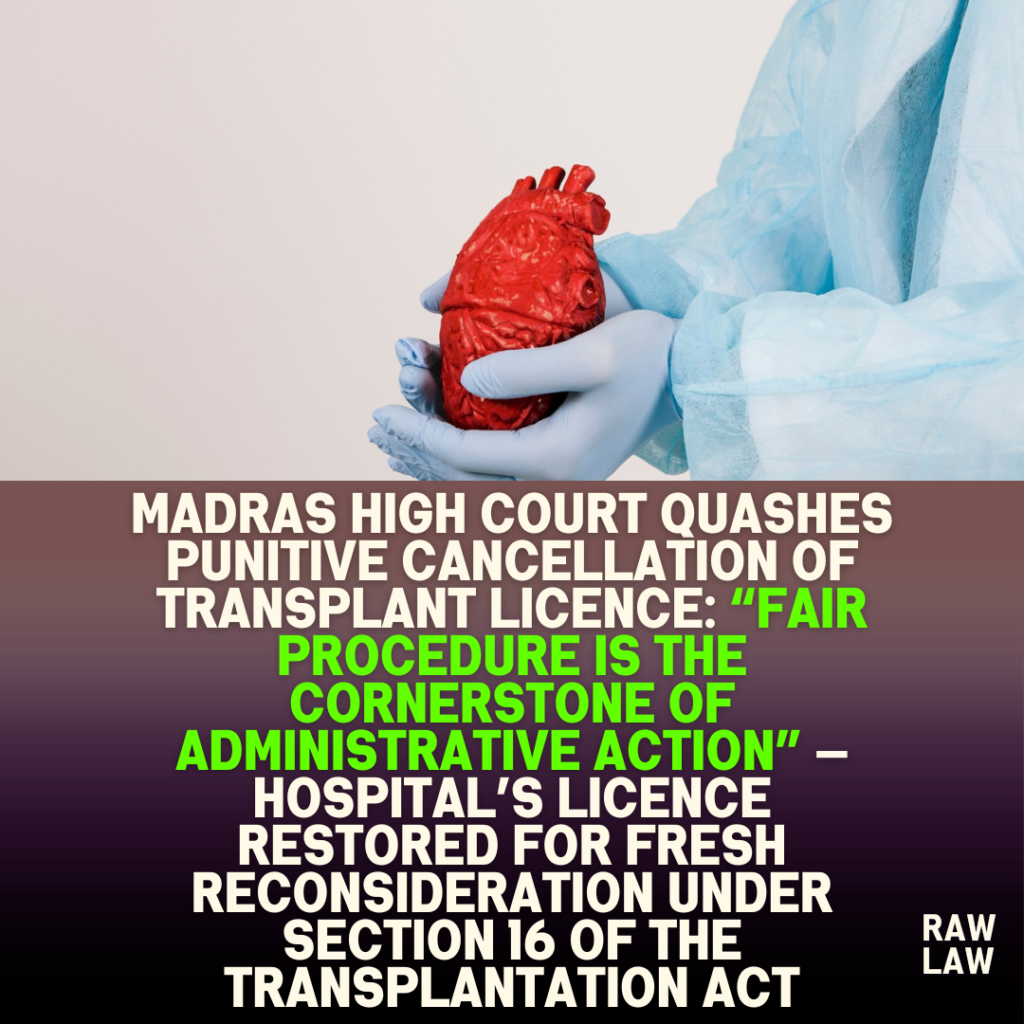Court’s decision
The Madras High Court set aside the suspension and cancellation of the hospital’s approval under the Transplantation of Human Organs and Tissues Act, 1994, holding that the authorities acted in violation of statutory procedure and principles of natural justice. The Court observed that “fair procedure is the cornerstone of administrative action, particularly when the consequences are severe.” It held that no cancellation could be sustained without a proper enquiry under Section 16. The Court remanded the matter back to the competent authority with directions to conduct a fresh, lawful, evidence-based assessment after affording full opportunity to the hospital.
Facts
The petitioner hospital was an approved transplant centre under the Transplantation of Human Organs and Tissues Act, 1994, authorised to perform kidney transplants. Based on adverse findings in an inspection report, the State authorities suspended and later cancelled its approval, alleging procedural lapses and irregularities in transplant documentation. The hospital asserted that the suspension and cancellation were imposed without adhering to Section 16, which mandates a detailed enquiry and an opportunity of hearing. It claimed that no show cause notice containing specific charges was issued and that arbitrary administrative action had crippled its functioning. Aggrieved, it approached the High Court.
Issues
The Madras High Court addressed the following issues:
- Whether the cancellation of transplant approval complied with Section 16 of the Transplantation of Human Organs and Tissues Act, 1994.
- Whether the hospital was given a fair opportunity to respond to the alleged violations.
- Whether the impugned order was reasoned, evidence-based, and legally sustainable.
- Whether an administrative authority can impose punitive sanctions without conducting a statutory enquiry.
- Whether the High Court should intervene in an order passed without due process.
Petitioner’s arguments
The hospital contended that the authorities acted mechanically and in complete breach of Section 16, which requires a proper enquiry before cancelling approval. It argued that the inspection-based allegations were never communicated in detail and that the hospital was denied the opportunity to produce counter-evidence. The petitioner emphasised that the impugned cancellation gravely affected its reputation, its patients, and ongoing medical procedures, making procedural fairness indispensable. It maintained that the decision was unsupported by material facts, contained no analysis, and was punitive rather than regulatory. The petitioner urged the Court to quash the order and restore its licence.
Respondent’s arguments
The State contended that the inspection had revealed irregularities amounting to serious violations, justifying immediate administrative action. It argued that Section 16 allowed cancellation if the authority was satisfied that the hospital had breached mandatory requirements. The respondents submitted that the hospital had been informed of the discrepancies and that the cancellation was made in the public interest. They maintained that the seriousness of violations warranted strong corrective action and emphasised regulatory responsibility in organ transplantation matters.
Analysis of the law
The Madras High Court analysed Section 16 of the Transplantation of Human Organs and Tissues Act, noting that cancellation of a hospital’s approval requires:
- A statutory enquiry,
- Notice of specific charges, and
- Opportunity to present evidence.
The Court stressed that cancellation is a drastic consequence and therefore procedural safeguards must be strictly followed. It held that mere receipt of an inspection report is insufficient unless its contents are shared and the hospital is invited to respond. The Court further emphasised that administrative authorities must record reasons to justify their satisfaction, as reasoned decisions are integral to judicial review.
Precedent analysis
The Court relied on established principles from administrative law, holding that punitive administrative orders must be founded on compliance with natural justice. The judgment referred to precedents affirming that statutory powers requiring “satisfaction” are not subjective but must be based on material evidence. It reiterated that failure to supply inspection reports or issue detailed show cause notices vitiates orders. The Court also relied on rulings that mandates under special statutes must be strictly followed, especially where hospitals, institutions, or professional licences are affected.
Court’s reasoning
The Madras High Court held that the authority failed to conduct any enquiry contemplated under Section 16. It found that no reasoned notice had been issued and that the hospital was unaware of the precise allegations. The impugned order lacked analysis, contained no evaluation of explanations, and merely reproduced the inspection report. The Court observed that such mechanical reproduction without verification does not amount to a statutory enquiry. Since the cancellation had severe consequences on the functioning of the hospital and the rights of patients, the Court held that adherence to procedural safeguards was mandatory. It concluded that the order was unsustainable.
Conclusion
The Madras High Court quashed the cancellation of the hospital’s transplant approval and restored its licence temporarily, subject to the outcome of a fresh enquiry. It directed the competent authority to conduct a lawful, fair, and evidence-based proceeding under Section 16, supply all adverse materials to the hospital, and allow personal hearing before passing any order. The Court clarified that it was not expressing any view on the merits of allegations. It emphasised that statutory procedure, especially in medical regulatory matters, must be followed scrupulously.
Implications
This decision reinforces that hospitals cannot face punitive regulatory action without due process. The judgment clarifies that suspension or cancellation of a transplant licence under Section 16 requires strict adherence to statutory enquiry norms. Authorities must supply inspection materials, issue detailed notices, allow explanation, and pass reasoned orders. This protects institutional rights while maintaining regulatory discipline. The ruling will influence administrative fairness in licensing matters across medical and health-regulatory sectors.



